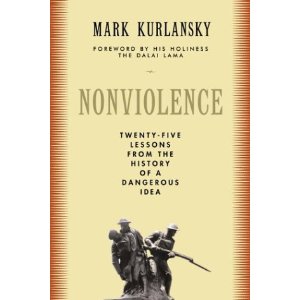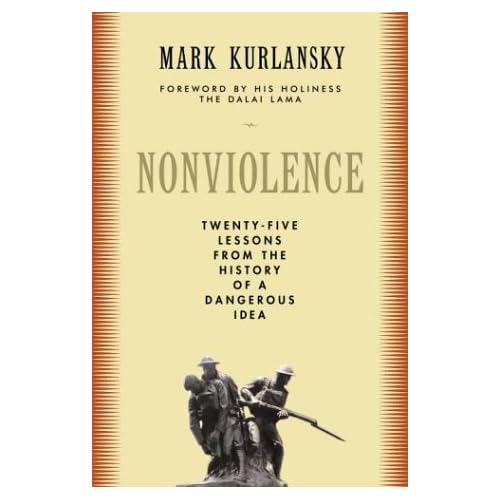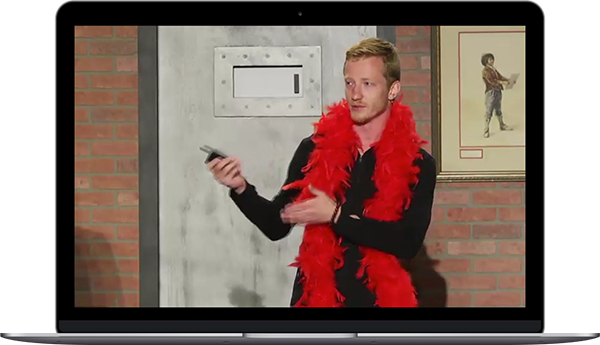

This post just summarizes the 25 Lessons that are discussed in detail in Mark Kurlansky’s book Nonviolence: 25 Lessons from the History of a Dangerous Idea … these are not my own ideas, but the reading certainly stimulated me to think deeply about the concept of dealing with conflicts nonviolently, and gave me a enlightening new perspective on human history, especially within the scope of war, peace, religion, and politics.
Below are the 25 Lessons … I encourage you to pick up the book if you are at all stimulated by these concepts. Also, I welcome all comments, especially debate and controversy!
The lessons:
- There is no proactive word for nonviolence.
- Nations that build military forces as deterrents, will eventually use them.
- Practitioners of nonviolence are seen as enemies of the state.
- Once a state takes over a religion, the religion loses its nonviolent teachings.
- A rebel can be defamed and co-opted, by making him a saint after he is dead (e.g. Gandhi)
- Somewhere behind every war, there are always a few founding lies.
- A propaganda machine promoting hatred always has a war awaiting in the wings.
- People who go to war start to resemble their enemy.
- A conflict between a violent and a nonviolent force is a moral argument. If the violent side can provoke the nonviolent side into violence, the violent side has won.
- The problem lies not in the nature of man, but in the nature of power.
- The longer a war lasts, the less popular it becomes.
- The state imagines it is impotent without a military because it cannot conceive of power without force.
- It is often not the largest, but the best organized and most articulate group that wins.
- All debate momentarily ends with an enforced silence once the first shots are fired.
- A shooting war is not necessary to overthrow an established power, but is used to consolidate the revolution itself.
- Violence does not resolve, it always leads to more violence.
- Warfare produces peace activists. A group of veterans is a likely place to find peace activists.
- People motivated by fear do not act well.
- While it is perfectly feasible to convince a people faced with brutal repression to raise up in a suicidal attack on their oppressor, it is almost impossible to convince them to meet deadly violence with nonviolent resistance.
- Wars do not have to be sold to the general public if they can be carried out by an all-voluteer professional military.
- Once you start the business of killing, you just get deeper and deeper without limits.
- Violence always comes with a supposedly rational explanation, which is only dismissed as irrational if the violence fails.
- Violence is a virus that infects and takes over.
- The miracle is, that despite all of society’s promotion of warfare, most soldiers find warfare to be a wrenching departure from their own moral values.
- The hard work of beginning a movement to end war has already been done.
Again… I look forward to comments, either supporting or refuting these points, and I that some of are inspired to pick up the book, as it might be like nothing you’ve ever read before.
Also, if you liked this post, please subscribe to my blog and newsletter:


I do not believe that in number 8 it is always the case.
8. People who go to war start to resemble their enemy.
It’s called the nature of man. There are those who don’t care and if you let them will take what ever they want, even your life. Some are psychotic and must be put down like a rabid dog. Others when faced with the chance of them being hurt will respect your rights.
“Nations that build military forces as deterrents, will eventually use them.”
I think they are necessary for a country like ours(for todays “time” period)
“The state imagines it is impotent without a military because it cannot conceive of power without force.”
nonviolence(peace) is something the “big” countries need to agree on and pursue in unison with one another.
This is a great post and I find it incredibly insightful though I may not agree with everything.
“Do not conquer the world with force, for force only causes resistance. Thorns spring up when an army passes. Years of misery follow a great victory. Do only what needs to be done without using violence.” -Tao Te Ching